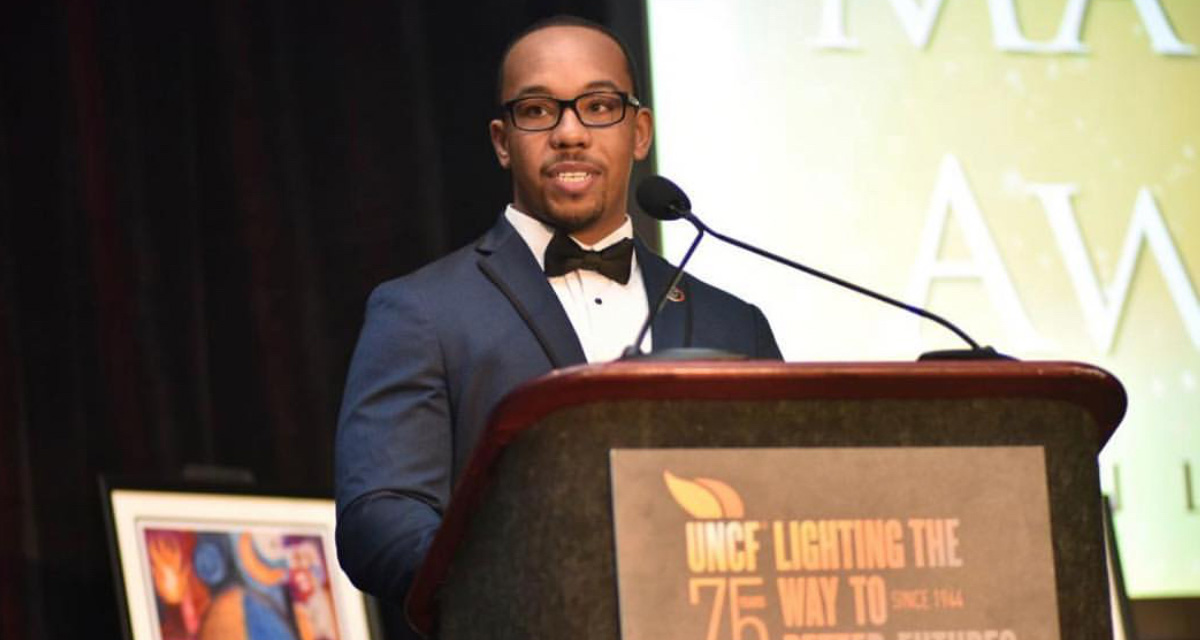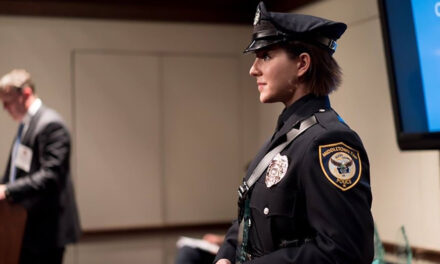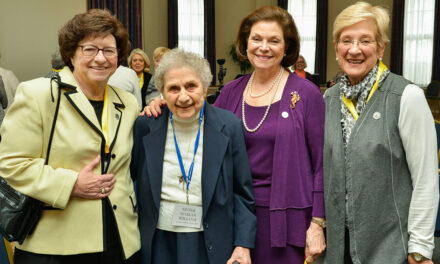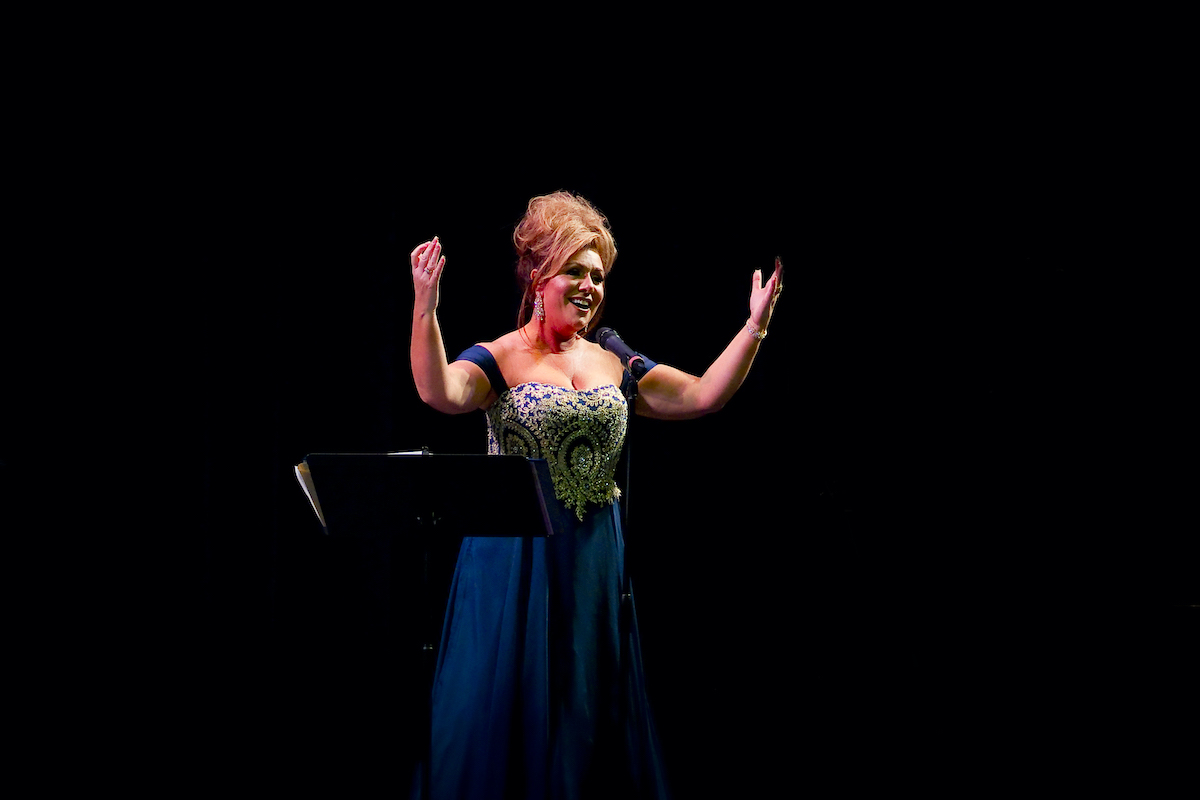For Xavier Brown ’15, “lifting as we climb” is all about giving back. He often uses the phrase, coined by Mary Church Terrell, founder of the National Association of Colored Women in 1896, to describe the importance of education as the key to unlocking the world for African Americans:
“And so, lifting as we climb, onward and upward we go, struggling and striving, and hoping that the buds and blossoms of our desires will burst into glorious fruition ‘ere long. With courage, born of success achieved in the past, with a keen sense of the responsibility, which we shall continue to assume, we look forward to a future large with promise and hope. Seeking no favors because of our color, nor patronage because of our needs, we knock at the bar of justice, asking an equal chance.”
Brown is in his final year of a doctoral program in educational leadership and administration at Saint Joseph’s University in Philadelphia. His dissertation explores the early college high school experiences of first-generation African American students. Alumni of the Early College High School at Delaware State University in Dover, Delaware provide Brown with insight into what were the most meaningful support services and resources that helped them graduate from high school and earn 60 college credits.
“The model aligned with my growth goals and was an exact match to my heart’s work of developing systems to support and provide access and exposure to higher education for marginalized and underserved students of color,” he says.
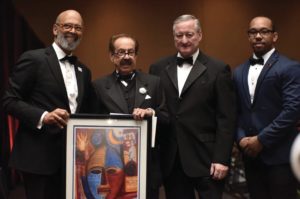
Brown, pictured at the Philadelphia UNCF Mayor’s Masked Ball, with L to R:
Dr. Lomax, president and CEO of UNCF; Mr. Bogle, president and CEO of the Philadelphia Tribune; and Jim Kenney, mayor of Philadelphia. The painting was one of the auction items for the fundraiser.
His dedication goes beyond research. From 2017-2020, he worked for the Community College of Philadelphia overseeing the development of the Parkway Center City Middle College, similar to the Early College High School model. The Parkway inaugural class will graduate in 2021 with a high school diploma and an associate degree in liberal studies 75% of the student population identifies as first-generation African American students.
Brown is himself a first-generation African American student, and was selected among 20,500 national applicants to receive the Gates Millennium Scholarship during his senior year at Paul Robeson High School. The scholarship afforded him the opportunity to attend any accredited college or university in the U.S. to earn his bachelor’s, master’s and doctoral degrees.
Lifting others as he climbs, Brown now serves as an ambassador for both the Gates Millennium Scholarship and the United Negro College Fund, which is the administrator of the Gates Scholarship. In this role, Brown mentors young men and women who are pursuing undergraduate and graduate degrees and helps fundraise to support future scholarships.
Before his junior year of college, Brown transferred to Immaculata to major in psychology and sports communication. His first visit to campus changed the trajectory of his life. While waiting to interview with Maria Cuddy-Casey, Ph.D., professor of psychology, Brown noticed a sheet of paper hanging on the wall––it was a poem. It has been seven years since Brown read that poem, but it encapsulates everything that he experienced at Immaculata. The gist of the poem reflects that students are the center of education, and if it weren’t for students, we wouldn’t be here.
“That poem shaped my identity and everything about why Immaculata was the perfect fit for me. Because, in a nutshell, that is who I am today. I am an educator and it’s why I am a researcher on educating students—putting them at the core of education,” says Brown.
While at Immaculata, Brown played on the basketball team and participated in the Black Male Success Initiative, attending planning meetings with administrators and faculty, helping build community among the black male students and speaking on behalf of black students at various events. As a senior, Brown suffered a career-ending injury when he tore his ACL. Serendipitously, at that time, he was taking a sports psychology course with Peter Rondinaro, Ph.D. Brown credits that course for helping him understand the significance that an individual places on identifying as a student-athlete.
After graduating from Immaculata, Brown attended the University of Pennsylvania’s Graduate School of Education to earn his master’s degree. His decision to study school and mental health counseling stemmed from his observation of the limited number of African American students in higher education. As his attention toward this dilemma increased, he began to focus on college access and the educational aspects of counseling. During this time, he served as an academic advisor at Freire Charter School. Most recently, he was the interim high school principal at Boys’ Latin Philadelphia Charter School.
In addition to finishing his doctorate, Brown is working towards his license for professional counseling. Currently, he has a private counseling practice specializing in supporting athletes who have been impacted by an injury that affects their identity and causes grief or loss—just as he endured at Immaculata.
As a lifelong resident of West Philadelphia, Brown is beautifying his neighborhood by investing in residential real estate, providing affordable housing for the community. Additionally, Brown is giving back and lifting youth by coaching and serving on the board of the Philly Hurricanes, a student-athlete basketball development, academic support and mentorship program.
“Xavier is someone I knew I would hear from again,” Professor Cuddy-Casey says. “His positive energy was contagious and charisma of genuineness was evident in every interaction I had with him. I knew Xavier would continue to go on to do great things.”

